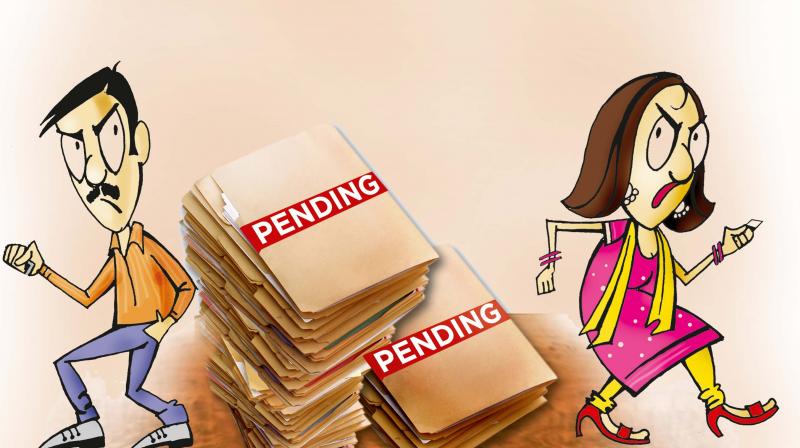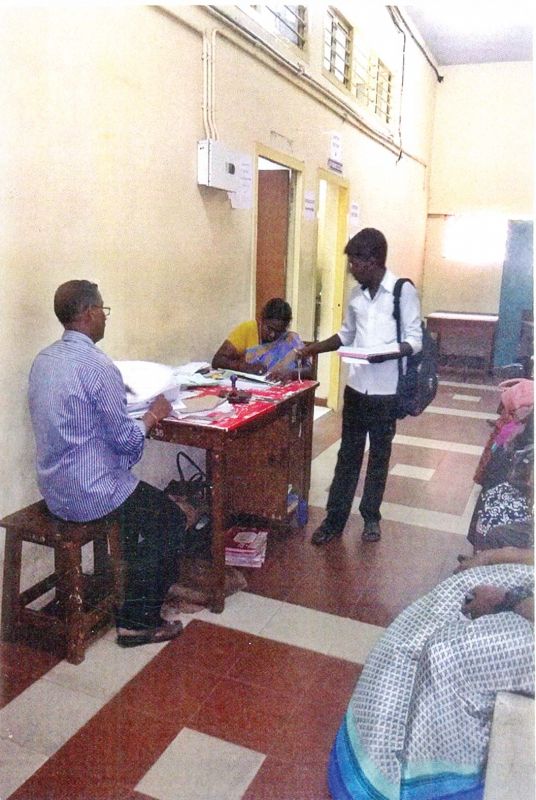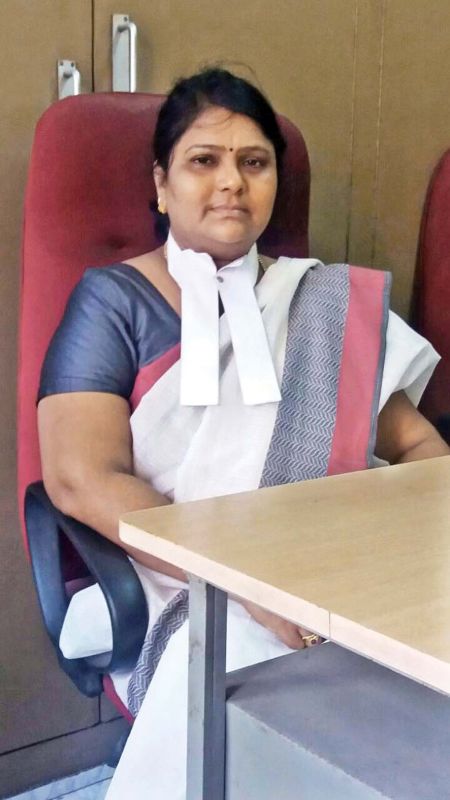Chennai: Justice delayed in family courts

Chennai: The creation of four more additional family courts in the city has not yielded any positive result in respect of disposal and pendency of cases so far, due to lack of basic infrastructure facilities and a sufficient number of staff for the smooth and effective functioning of the courts.
The first family court in Chennai was established in 1988. Within two years, the first additional family court was set up in 1990. After a gap of four years, the second additional family court was created in 1994. Nearly 16 years thereafter, the third additional family court was launched.
Considering the huge pendency of cases, then the Chief Justice of the Madras High Court M.J. Eqbal introduced holiday courts on July 15, 2011. However, since the litigants and advocates had felt uncomfortable in attending the courts on Saturday and Sunday, on a petition filed by a member of the Women Lawyers’ Association, the functioning of the court on Sunday was dropped by the Madras high court.
 Space constraint: Filing section staff function on the corridor of a court hall and affix seal on a petition from a litigant before filing it in the family court.
Space constraint: Filing section staff function on the corridor of a court hall and affix seal on a petition from a litigant before filing it in the family court.
While so, highlighting the plight of litigants, attending the family courts for years together to get justice with regard to their family problems including maintenance, advocate R.Y. George Williams had on March 31, 2015, sent a representation to the Chief Justice to direct the government to constitute 15 additional family courts in Tamil Nadu for speedy disposal of the cases.
Meanwhile, while hearing a case relating to a matrimonial dispute, Justice N. Kirubakaran had on June 16, 2015, raised 10 queries to be answered by the Registrar General of the Madras high court and the state law secretary.
The queries included how many cases were filed and disposed of during the last 10 years and whether the existing courts were sufficient to handle the cases being filed and if not, how many additional courts were necessary based on the rate of filing and pendency of cases. Giving the statistics relating to filing and disposal of cases, the registrar general in his report said he has requested the government to double the existing 4 family courts in Chennai, based on the heavy pendency and the time (2 to 5 years) taken to dispose of the cases. Till now, the case is pending before Justice Kirubakaran.
Pursuant to the observation made by Justice Kirubakaran and accepting the proposal given by the registrar general, the state government had on November 19, 2015, passed an order sanctioning the creation of four more additional family courts with 23 staff for each court and other infrastructure facilities like a computer with accessories, typewriters and a library. The four additional family courts were inaugurated on July 21, 2017. Meanwhile, disposing of a petition from advocate R. Chitravelu, the first bench comprising Chief Justice Indira Banerjee and Justice M. Sundar had on July 28, 2017, said steps shall be taken to ensure that the courts which have been inaugurated were provided with all usual facilities required for the proper running of the courts.
However, no infrastructure facilities and adequate staff strength were provided to the courts, functioning on the premises of the Madras High Court till now. As a result of which, the pendency of cases has not come down.
Moreover, there is an increase in the filing of cases relating to matrimonial disputes. This is mainly due to a misunderstanding between the parties. Earlier, there was joint family and if any dispute arises, the elders will intervene and sort out their problems. Nowadays, soon after the marriage, the couples start living separately. Therefore, even for petty matters, they fight against each other and finally land up in the courts.
D. Prasanna, former president of WLA says, “The court halls are all very small. It could accommodate only 25 people at a time. But 100 to 150 cases are listed for hearing every day. Unlike other courts, the presence of the parties is necessary before the family courts. With their advocates accompanying them, nearly 400 to 500 persons will be attending the courts every day. Moreover, there is no proper ventilation and air in family courts. Due to which, not only the litigants and advocates, but also the judges are suffering.
There should be big court halls and a peaceful atmosphere so that the parties facing problems could sort out their issues and come out for a settlement”.
On the rise tell tale numbers
In the month of August 2017 alone, there were 1,569 cases pending at the beginning of the month before the principal family court and there were 315 cases either instituted or received by transfer. Of the 1,884 cases, only 471 cases were either disposed of or transferred and 1413 cases were pending now. There were totally 3,836 cases pending for disposal before the I additional principal family court. Of which, 1,479 cases were either disposed of or transferred. There were 2,989 cases pending before the II additional principal family court and 1,207 cases were either disposed of or transferred. Similarly, of the 2,799 cases were pending before the III additional principal family court, 1,220 cases were either disposed of or transferred.
In the newly created IV additional family court, there were 751 cases pending for disposal and of which only 33 cases were disposed of. There were 1, 306 cases pending for disposal before the V Additional family court. Of which only 34 cases were disposed of. There were 1,220 cases pending before the VI additional family court. Of which, 45 cases were disposed of. Similarly, of the 858 cases pending before the VII additional family court, 46 cases were disposed of.
What’s the solution?
V. Nalini, president of Women Lawyers Association, says, “Despite the creation of more family courts, the situation relating to the pendency of cases still exists. There are so many reasons for it. The court has to refer fit cases for mediation since there will be free talk and discussion between both parties during mediation and there is a possibility of bringing quietus to the issues whether divorce or mutual consent or maintenance. There are 8 courts functioning now. At least one judge goes on leave every day on an average. Therefore, the cases are accumulating. Some cases are referred to Adalat. But I feel this is useless since the issue pertains to the family. It cannot be settled in Adalat. Instead, they can be referred to mediation, where there will be several hearings and more attempts will be made to reunite the parties and there will be a possibility of settlement”.
Short-staffed and poor infra
According to advocate George Williams, as per the GO, the government has to provide 22 staff barring the district judge in each of the 4 new family courts. But no staff has been appointed far. Only with the existing staff and a few people drawn from city civil court, the courts were functioning. Moreover, the infrastructure facilities mentioned in the GO have not been provided. Even there is no separate room for filing the petitions. The filing section functions on the corridor of the courts. The litigants are suffering and their cases have not been disposed of in time.
Not enough woman judges, case bundles go missing...
Deserted by her husband, a 33-year-old woman is knocking at the doors of justice to get the maintenance amount from him for herself and her two daughters for the last 9 years.
Shabitha (named changed) and Sridhar (name changed) got married on March 4, 1999. Initially, she was living with her husband in his house in the city peacefully and out of the wedlock, she gave birth to two daughters. Thereafter, according to Shabitha, he started giving troubles to her. He allegedly treated her cruelly. He used to pick up quarrels unnecessarily and beat her mercilessly, suspecting her fidelity. Finally, he sent her out from the matrimonial abode. She was living with her parents. Though her husband was earning well, besides getting rental income, he has not paid any amount for her maintenance. Therefore, she filed a petition before a family court, seeking maintenance of Rs 20,000 per month from him in 2008 and the case was still pending before the family court.
Meanwhile, since her daughters (then aged 9 and 5), who were living with her husband were not sent to school, but allegedly forced to do household work and made to sleep in the bathroom and tortured, she filed a petition and got the custody of her children. Now, her parents have to take care of her and her children.
 Prasanna
Prasanna
Asked as to why the case was pending for nearly 9 years, her counsel D. Prasanna, also a former president of Woman Lawyers’ Association says, “Shabitha’s husband is dragging the matter unnecessarily and taking unwanted adjournments on some ground or the other. Initially, by an ex-parte order, the court directed him to pay an interim maintenance of Rs 5,000. But, on a petition moved by him, the order was set aside. The maintenance petition filed by Shabitha is still pending. Meanwhile, the case bundle went missing from the court and it could not be traced for nearly one and half years. Now only, the bundle was traced”.
Similarly, Maharani (name changed) is fighting against her husband for maintenance and reunion for nearly 9 years. Maharani got married to Raja (name changed) on September 16, 1999. Within 3 months of their marriage, he got a government job. From that day, according to Maharani, he started harassing her and demanded more dowry from her. Thereafter, he abandoned her. Immediately, she filed a dowry harassment complaint and also petitions before the family court for a reunion and seeking maintenance in 2008. However, in order to overcome all these proceedings, he had convinced her by saying that he will live with her happily. Believing his words, she withdrew her cases. Immediately, thereafter, he deserted her and she was now living with her old father. Therefore, again, she filed a petition for maintenance before the family court in 2011. But even after six years, the case was still pending before the court.
These two cases are just an example to illustrate how the cases involving family problems are pending before the family courts for years together. The mental agony and trauma, which the litigants undergo is alarming. By the time the litigant gets relief, he/she will become old and will not be in a position to enjoy the fruits, Prasanna added.
Prasanna, also Maharani’s counsel, further said, “There are several reasons for the delay in disposal of cases. The major problem is quite often the case bundles go missing. Despite complaints from advocates and litigants, the bundles could not be traced at least for a year. The first hearing starts only after one and half months of filing the petition. There is no necessity for the same. The petitions can be taken up for hearing as soon as it is filed. Moreover, the family courts are giving liberal adjournments (normally two months adjournments), which was not at all warranted in these type of cases where the issue relates to family disputes. Of the 8 courts functioning now, there is only one woman judge. Since the matter involves matrimonial disputes, if more woman judges are posted for hearing such cases, it will give room for a conducive atmosphere for the parties to settle the issues amicably. Above all, no adequate staff is provided for the smooth functioning of the courts”.

